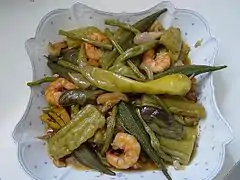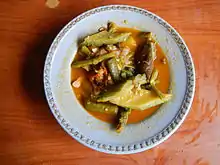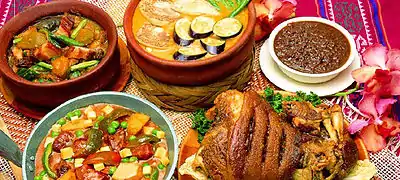Pinakbet
Pinakbet (also called pakbet or pinak bet) is an indigenous Filipino dish from the northern regions of the Philippines. Pinakbet is made from mixed vegetables sautéed in fish or shrimp sauce.[1] The word is the contracted form of the Ilokano word pinakebbet, meaning "shrunk" or "shriveled."[2] The original Ilocano pinakbet uses bagoong of fermented monamon or other fish, for seasoning sauce, while further south, bagoong alamang is used. The dish usually includes bitter melon (ampalaya).[3] Other vegetables used include eggplant, tomato, okra, string beans, chili peppers, parda, winged beans, and others. Root crops and some beans like camote, patani, kadios are optionally added. The young pod of marunggay is added. It is usually spiced with ginger, onions, or garlic. A Tagalog version typically includes calabaza (kalabasa).
 True pinakbet from Ilocos region with shrimp | |
| Alternative names | Pakbet |
|---|---|
| Course | Main course |
| Place of origin | Philippines |
| Associated national cuisine | Filipino cuisine |
| Serving temperature | Hot |
| Main ingredients | Bagoong or alamang, vegetables, fish, meat |
| Similar dishes | Dinengdeng |


Most of these vegetables are easily accessible and are grown in backyards and gardens of most Ilocano households. As its name suggests, it is usually cooked until almost dry and shriveled; in the Tagalog version, the flavors of the vegetables are accentuated with shrimp paste. In some cases, lechon, chicharon, or other meats (most commonly pork) are added.
See also
- Dinengdeng — a term usually used by Ilocanos pertaining to any vegetable dish. Though different, dinengdeng is often used interchangeably with pinakbet. These two are different in cooking procedures and even in ingredients.
References
- David Yen Ho Wu; Sidney C. H. Cheung (2002). Wu: Globalization of Chinese Food. University of Hawaii Press. p. 183. ISBN 978-0-8248-2582-9. Retrieved 24 March 2013.
- "Pakbet / Pinakbet". San Pablo City. 2010. Archived from the original on 2018-04-08. Retrieved 2012-07-24.
- Johnson-Kozlow, Marilyn; Matt, Georg E.; Rock, Cheryl L.; de la Rosa, Ruth; Conway, Terry L.; Romero, Romina A. (2011). "Assessment of Dietary Intakes of Filipino-Americans: Implications for Food Frequency Questionnaire Design". Journal of Nutrition Education and Behavior. Society for Nutrition Education and Behavior. 43 (6): 505–510. doi:10.1016/j.jneb.2010.09.001. PMC 3204150. PMID 21705276.
| Wikimedia Commons has media related to Pinakbet. |
